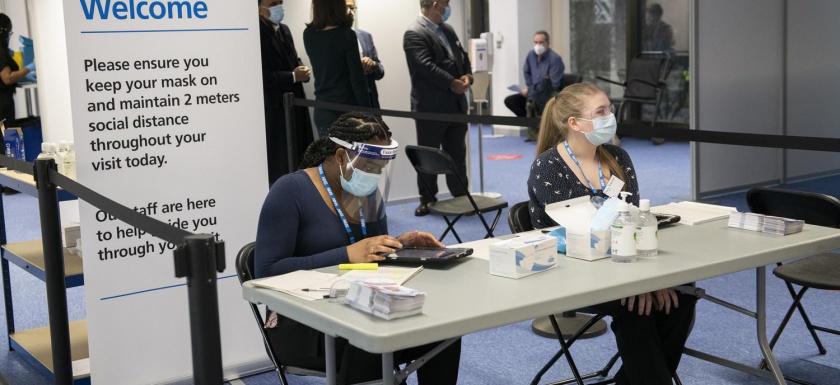
Source: NHS North West London
Copyright: North West London CCG
License: Licensed by the authors
Analysis of northwest London data from the beginning of the national COVID-19 vaccination program has further supported the evidence that a single dose of the COVID-19 vaccine is effective in reducing infection with SARS-CoV-2 for up to 60 days after vaccination.
The study is an example of how access to detailed, long-term patient data from across the North West London Integrated Care System (ICS) can be used to directly benefit patients and improve care. In this case, collaborative analysis of vaccination data by clinicians and researchers has been used to influence the ongoing delivery of the vaccination program in northwest London by offering real-world evidence for consideration by the “Gold” command group for vaccination, chaired by the trust’s medical director Prof Julian Redhead, who is also a coauthor of the paper.
The analyzed data are from 4 acute, 2 mental health, and 2 community trusts across 8 clinical commissioning groups, alongside social care data from 8 boroughs and primary care data from 360 general physician practices.
The assessment of more than 2 million adults eligible for COVID-19 vaccination in northwest London was undertaken by the Imperial College Healthcare National Health Service (NHS) Trust in partnership with Imperial College London and looked at vaccine data between December 8, 2020, and February 24, 2021. The data showed no difference between the Pfizer or AstraZeneca vaccines; a single dose of either vaccine was effective in reducing the risk of testing positive up to approximately 60 days after vaccination. The data also showed a higher rate of vaccine decline (16%) among Black or Black British individuals and those living in the most deprived postcode areas (13%).
Senior author Erik Mayer, transformation chief information officer at the Imperial College Healthcare NHS Trust and clinical reader at Imperial College London said the following:
It’s been more critical than ever during the Covid-19 pandemic to understand the communities we care for and population data such as this has provided critical insight for the vaccination programme especially. The analysis could be used to direct resources as effectively as possible and reach groups the data suggested may be hesitant about taking up the vaccine with clear information to help inform decisions. The unique iCARE/WSIC population datasets provide a significant insight into our local populations and have the potential to be one of the most impactful resources we have for improving patient care and outcomes. I believe that through the NIHR Imperial iCARE, and its robustly governed dataset access, we provide a significant insight to help improve patient care and outcomes across NWL, nationally and globally.
Bob Klaber, director of strategy, research, and innovation, said the following:
This data-driven initiative has provided really helpful insights from which were able to plan a wide range of community engagement events to listen to local residents, and to understand any concerns or anxieties they had around Covid vaccines. As we think more widely about opportunities to deliver more preventative care, we will use this learning to work closely with our local communities and continue to share information with our local populations to help them to make informed decisions about their health wherever we can.
Kavitha Saravanakumar, associate director of business intelligence, North West London Collaboration of Clinical Commissioning Groups, said the following:
It’s great to also see this data supporting evidence across the world for the effectiveness of Covid-19 vaccines. This analysis looked at data from the beginning of the national vaccination programme, where north west London was one of the first to initiate a programme organised by the ICS. It is reassuring that one dose is still effective for those who are awaiting their second dose, which boosts and provides longevity of the protection.
Published in JMIR Public Health and Surveillance, the study also concluded that the risk of contracting COVID-19 at a vaccination hub was very low, and the risk of contracting COVID-19 or being hospitalized with it was also very low among the vaccinated population.
In 2019, the National Institute for Health Research’s Imperial Biomedical Research Centre (BRC), a translational research partnership between Imperial College Healthcare and Imperial College London, invested in a high-performance platform, called Imperial Clinical Analytics, Research & Evaluation (iCARE), which could help make the information held in the trust’s electronic patient record and related clinical systems appropriately accessible for use in both research and direct patient care, while maintaining a clear and robust process for access that ensures the safety of the data.
When the pandemic struck in early 2020, the need for real-time data within the trust and across northwest London was critical in supporting the NHS’ response. iCARE adapted to support the response by hosting near to real-time data feeds, which had previously been unmanageable owing to the size and complexity of the data. Through the iCARE system, the study team were able to utilize large amounts of population data to better understand vaccination uptake and outcomes and inform the ongoing rollout of the vaccination program. This helped the NHS to ensure that the opportunity for vaccination reached as many people in northwest London as possible.
Ben Glampson, author and research informatics program manager at the trust, said the following:
By utilising the BRC’s iCARE platform and the established partnership between the Trust and Imperial College London, we could effectively provide real time input on the vaccine rollout that was based on data from real people. Our data also supports the findings from other academic studies which have suggested that the Covid-19 vaccine is effective against infection.
Original article:
Glampson B, Brittain J, Kaura A, et al. Assessing COVID-19 Vaccine Uptake and Effectiveness Through the North West London Vaccination Program: Retrospective Cohort Study. JMIR Public Health Surveill. 2021;7(9):e30010.
URL: https://publichealth.jmir.org/2021/9/e30010
doi: 10.2196/30010
PMID: 34265740
